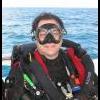It was a beautiful Fall day in South Florida. Air temperatures are finally starting to average below 90, and the water is still warm, clear and usually calm. There seems to be more current moving the water about this Summer compared to most of them as far as I can remember. So, I was happy to hear that one of my favorite dive boats, and an SD trip boat operation, RJ Diving, was planning on a drift dive. I booked my spot, and I made preparations to go.
I did all of the usual pre-dive equipment checks, and everything was set for the two dives. On the first dive, everything went as planned. The current was not especially strong. (Of course, there is none when you want it.
At the end of the dive, I took the float ball line from another diver, and I wound it up as I made my slow ascent, stopping along the way as I moved up into the shallows. At 20 feet, I flushed my loop with pure oxygen, maintaining a partial pressure of oxygen at 1.20 and beyond during the five minutes I spent at 20. I then moved up to 15, and then 10 feet, allowing the PPO2 to remain at 1.0 or higher so as not to be wasteful of oxygen. (It requires more frequent flushes to maintain high PPO2s as one moves shallow.)
After a short surface interval, we moved to a shallow reef. Max depth was to be no more than about 25 feet. Viz was still at least 50 to 70 feet in the shallows, and things shaped up to look like it was going to be a great dive.
In the water, I my buddy and I saw a nice eagle ray, and the coral was about the best there is in Miami. So, I was having a great time. During the hour, I noticed that the difference between the highest reading oxygen sensor (there are three of them) and the lowest was about .15 or so. This is common after longer dives with the sensors getting exposed to the moist gas in the loop. (Sensors will soon become available that will remedy the reaction problem with moisture. I hope that they come out soon.)
Really, the dive went without episode all the way until the end. Although I didn't really need to worry about decompression after such a dive, out of habit, and to verify that my oxygen sensor cells were functioning properly, I did an oxygen flush. It was then that I noticed that one cell was reading 1.25 or so while the other two were only reading about 1.0. This was getting to be the maximum spread allowed before having serious doubts about the cells' function. I flushed again, and sensor 1 went up to 1.4 while sensors 2 and 3 stayed just above 1.0. At 20 feet, using pure oxygen, it is possible to reach about 1.6 or just under that if the diver keeps flushing. So, I was doubting the readings of the last two sensors.
Sensor numbers 1 and 3 are about 8 months old. Sensor number 2 I just replaced about three dives ago. I was planning on replacing sensor 3 next month, and then sensor 1 would be replaced in November. They typically last an average of about a year. So, my plan was to stagger the replacement to finish up the job just before then. (Protocol is to stagger replacement in case you get a bad batch of sensors, and so that they don't all go out at the same time if there is a failure.)
Millivolt reading of sensor 2 is down to 8 on the surface in air. It should be reading from 9 to 12 at the surface in air. Sensor 3 was at 9 to 10. However, it is time for me to change it anyway. I am not going to bother to see how it reads in pure oxygen. It is time for it to go.
When sensors start to go, they will start reading a higher PPO2 at a lower number than actual. So, they might read 1.0 even if you have 1.8. This could lead to an oxygen exposure that is dangerous to the diver. Had I been deep diving, and had I relied on the two lower reading sensors alone, I might have had a higher oxygen exposure than planned. In fact, I could have been pretty close to the line especially on a long dive.
This is one reason that I dive at 1.0 most of the time instead of 1.3 or 1.4 as some "old school" CCR divers will dive. The only time that I will go above this setting is during ascent and decompression. Even then, most of the time I keep things between 1.2 and 1.4 rather than 1.6. However, I will flush the unit in the shallows for a quick spike just to test the sensors. On this occasion, I found that I got one that is bad out of the box, and the other one is ready for a change.
It is not like I invented the protocols. I am just glad that I follow them. In this case, it made what could otherwise turn out to an incident just another time for some routine maintenance.















